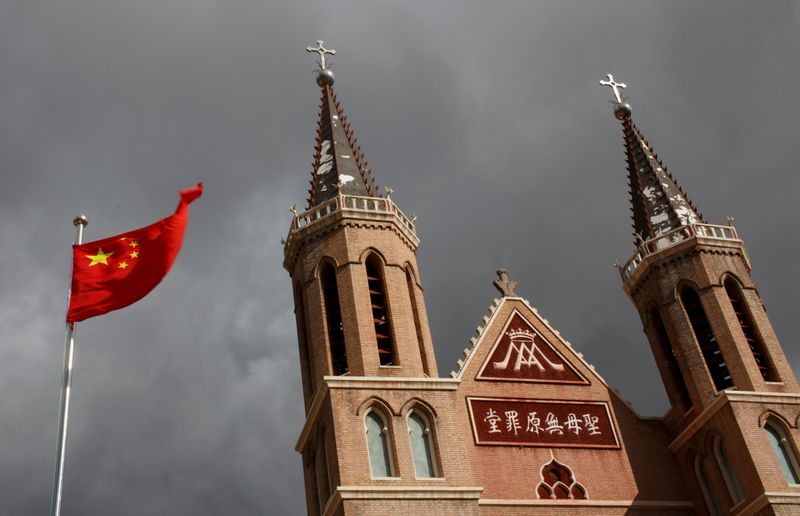VATICAN CITY (Reuters) – Vatican officials have defended their intention to renew an accord with Beijing that gives the pope say over the appointment of Chinese bishops, following a highly unusual public call from U.S. Secretary of State Mike Pompeo to abandon it.
In a series of Tweets and an editorial in a conservative U.S. Catholic journal published on Saturday, Pompeo said the Vatican should not renew the agreement, which was signed two years ago and expires next month.
“The Vatican endangers its moral authority, should it renew the deal,” Pompeo Tweeted.
Three senior Vatican officials who spoke to Reuters on the condition of anonymity said the Holy See was taken aback by the comments by Pompeo, who is due to visit the Vatican at the end of this month.
Pope Francis has signed off on a two-year extension of the agreement with Beijing, which allows the pope final say over the appointment of bishops in China and also permits Chinese Catholics to recognise him as leader of the universal Church.
Before the deal, the state-backed official Catholic Church in China was barred from recognising the authority of Rome, while an underground, unofficial Church continued to do so.
Some conservative critics have condemned the deal as a sell-out to the communist government. President Donald Trump, who faces re-election in November, has campaigned on his willingness to take a tough line with China, and also has support among conservative Christians who have clashed with the pope.
In a Tweet, Archbishop Mark Coleridge of Brisbane, Australia, criticised Pompeo’s comments as an “attempt to pressgang the Holy See into a questionable domestic political/electoral agenda playing itself out on the international stage.”
Pompeo said that since the Vatican’s deal with Beijing was reached, the conditions for Christians in China had worsened.
“Now, more than ever, the Chinese people need the Vatican’s moral witness and authority in support of China’s religious believers,” he said in an editorial in First Things journal.
In a clear comparison between Francis and Pope John Paul II, a hero to conservatives, Pompeo said the Church had inspired movements in Communist Eastern Europe that helped bring down the Berlin Wall in 1989.
“That same power of moral witness should be deployed today with respect to the Chinese Communist Party.”
NOT NORMAL DIPLOMACY
One of the senior Vatican sources said the Holy See was “surprised” about Pompeo’s intervention, given his coming visit.
“This is not a normal way to go about setting an agenda. Normally between ministries you have confidential exchanges to determine what is going to be on the agenda.”
The Vatican had spoken to U.S. officials about the comments but was not planning to make a public comment about it, one of the sources said.
The journal in which the editorial appeared has been highly critical of Pope Francis. Last year, its editor wrote a long commentary titled “A Failing Papacy”.
The three Vatican officials said the China deal was not perfect but gives the Vatican a direct channel for dialogue with Beijing after a break of nearly 70 years.
“Maintaining dialogue is one of the few, if not the only, tool of maintaining direct relations with China,” one said.
In response to Pompeo’s suggestion that the Vatican should take a tougher line, another one of the officials said: “We can make grandiose statements, but there is no indication that it will have any effect, except possibly making the situation worse for our Catholics on the ground.”
(Reporting by Philip Pullella; Editing by Peter Graff)




















